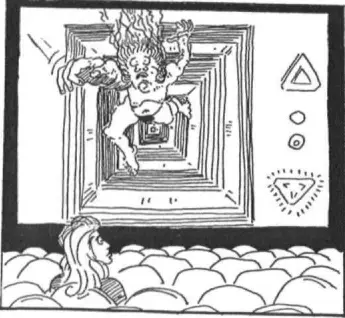Richard Bandler - Using Your Brain —for a CHANGE
- Название:Using Your Brain —for a CHANGE
- Автор:
- Жанр:
- Издательство:Real People Press
- Год:1985
- Город:Moab, Utah
- ISBN:0–911226–26–5
- Рейтинг:
- Избранное:Добавить в избранное
-
Отзывы:
-
Ваша оценка:
Richard Bandler - Using Your Brain —for a CHANGE краткое содержание
Bandler is an innovator and an original thinker in the field of psychology. This book is a transcript of Bandler live in front of an audience, cutting up and cracking jokes as he is prone to do, talking about some of his unique and often practical views on how you can change your feelings, thoughts and behavior. Change is often easier than you think if you use the right method.
Using Your Brain —for a CHANGE - читать онлайн бесплатно полную версию (весь текст целиком)
Интервал:
Закладка:
Man: I see myself in the memory I can laugh about; I'm an observer. But I feel stuck in the memory I still feel bad about, just like it's happening again.
That's a common response. Is that true for many of the rest of you? Being able to observe yourself gives you a chance to "review" an event "from a different perspective" and see it in a new way, as if it's happening to someone else. The best kind of humor involves looking at yourself in a new way. The only thing that prevents you from doing that with an event right away is not realizing that you can do it. When you get good at it, you can even do it while the event is actually happening.
Woman: What I do is different, but it works really well. I focus in like a microscope until all I can see is a small part of the event magnified, filling the whole screen. In this case all I could see was these enormous lips pulsating and jiggling and flopping as he talked. It was so grotesque I cracked up.
That's certainly a different point of view. And it's also something that you could easily try out when that bad experience is actually happening the first time.
Woman: I've done that, I'll be all stuck in some horrible situation and then I'll focus in on something and then laugh at how weird it is.
Now I want you all to think of two memories from your past: one pleasant and one unpleasant. Take a moment or two to re–experience those two memories in whatever way you naturally do. ...
Next, I want you to notice whether you were associated or dissociated in each of those memories.
Associated means going back and reliving the experience, seeing it from your own eyes. You see exactly what you saw when you were actually there. You may see your hands in front of you, but you can't see your face unless you're looking in a mirror.
Dissociated means looking at the memory image from any point of view other than from your own eyes. You might see it as if you were looking down from an airplane, or you might see it as if you were someone else watching a movie of yourself in that situation, etc.
Now go back to each of those two memories, in turn, and find out whether you are associated or dissociated in each one. . . .
Whichever way you recalled those two memories naturally, I want you to go back and try experiencing them the other way, in order to discover how this changes your experience. If you were associated in a memory, step back out of your body and see that event dissociated. If you were dissociated, step into the picture or pull it around you until you are associated. Notice how this change in visual perspective changes your feeling experience of those memories. . . .
Does that make a difference? You bet it does. Is there anyone here who didn't notice a difference?
Man: I don't notice much difference.
OK. Try the following. Feel yourself sitting on a park bench at a carnival and see yourself in the front seat of a roller coaster. See your hair blowing in the wind as the roller coaster starts down that first big slope. . . .
Now compare that with what you would experience if you were actually sitting in the front seat, holding onto the front of the roller coaster, high in the air, actually looking down that slope. . . .
Are those two different? Check your pulse if you don't get more of a zing out of being in the roller coaster looking down the tracks. It's cheaper than coffee, too, for becoming alert.
Woman: In one of my memories it seems like I'm both in it and out of it.
OK, There are two possibilities. One is that you are switching back and forth quickly. If that's the case, just notice how it's different as you switch. You might have to slow down the switching a little in order to do that well.
The other possibility is that you were dissociated in the original experience. For instance, being self–critical usually presupposes a point of view other than your own. It's as if you're outside of yourself, observing and being critical of yourself. If that's the case, when you recall the experience and "see what you saw at the time" you'll also be dissociated. Does either of those descriptions fit your experience?
Woman: They both do. At the time I was self–critical, and I think I was flipping back and forth between observing myself and feeling criticized.
There is even a third possibility, but it's pretty rare. Some people create a dissociated picture of themselves while they are associated in the original experience. One guy had a full–length mirror that he carried around with him all the time. So if he walked into a room, he could simultaneously see himself walking into the room in his mirror. Another guy had a little TV. monitor he'd put on a shelf or a wall nearby, so he could always see how he looked to other people.
When you recall a memory associated, you re–experience the original feeling response that you had at the time. When you recall a memory dissociated, you can see yourself having those original feelings in the picture, but without feeling them in your body.
You may, however, have a new feeling about the event as You watch yourself in it. This is what happens when Virginia Satir asks a question like, "How do you feel about feeling angry?" Try it. Recall a time when you were angry, and then ask that question, "How do I feel about feeling angry?" In order to answer that question you have to pop out of the picture, and have a new feeling about the event as an observer rather than as a participant. It's a very effective way to change your response.
The ideal situation is to recall all your pleasant memories associated, so that you can easily enjoy all the positive feelings that go with them. When you are dissociated from your unpleasant memories, you still have all the visual information about what you may need to avoid or deal with in the future, but without the unpleasant feeling response. Why feel bad again? Wasn't it enough to feel bad once?
Many people do the reverse: they associate with, and immediately feel, all the unpleasantness that ever occurred to them, but their pleasant experiences are only dim, distant, dissociated images. And of course there are two other possibilities. Some people tend to always dissociate. These are the scientist/engineer types who are often described as "objective," "detached," or "distant." You can teach them how to associate when they want to, and regain some feeling connection with their experience. You can probably think of some times when this would be a real advantage for them. Making love is one of the things that's a lot more enjoyable if you're in your body feeling all those sensations, rather than watching yourself from the outside.
Others tend to always associate: they immediately have all the feelings of past experiences, good or bad. These are the people who are often described as "theatrical," "responsive," or "impulsive." Many of the problems they have can be cured by teaching them to dissociate at appropriate times. Dissociation can be used for pain control, for example. If you watch yourself have pain, you're not in your body to feel it.
You can do yourself a real favor by taking a little time to run through several of your unpleasant memories dissociated. Find out how far away you need to move the pictures so that you can still see them clearly enough to learn from them, while you watch comfortably. Then run through a series of pleasant experiences, taking time to associate with each one, and fully enjoy them. What you are teaching your brain to do is to associate with pleasant memories, and dissociate from unpleasant ones. Pretty soon your brain will get the idea, and do the same thing automatically with all your other memories.
Teaching someone how, and when, to associate or dissociate is one of the most profound and pervasive ways to change the quality of a person's experience, and the behavior that results from it. Dissociation is particularly useful for intensely unpleasant memories.
Does anybody in here have a phobia? I love phobias, but they're so easy to fix that we're running out of them. Look at that. The only people in here with phobias have phobias of raising their hands in an audience.
Joan: I have one.
Do you have a real, flaming phobia?
Joan: Well it's pretty bad. (She starts breathing rapidly and shaking.)
I can see that.
Joan: Do you want to know what it's about?
No, I don't. I'm a mathematician. I work purely with process. I can't know your inside experience anyway, so why talk about it? You don't have to talk about your inside experience to change it. In fact, if you talk about it, your therapist may end up being a professional companion. You know what you're phobic of. Is it something you see, or hear, or feel?
Joan: It's something I see.
OK. I'm going to ask you to do a few things that you can do in your mind really quickly, so that your phobia won't bother you at all, ever again. I'll give you the directions one part at a time, and then you go inside and do it. Nod when you're done.
First I want you to imagine that you're sitting in the middle of a movie theater, and up on the screen you can see a black–and–white snapshot in which you see yourself in a situation just before you had the phobic response. . . .
Then I want you to float out of your body up to the projection booth of the theater, where you can watch yourself watching yourself. From that position you'll be able to see yourself sitting In the middle of the theater, and also see yourself in the still Picture up on the screen. . . .
Now I want you to turn that snapshot up on the screen into a black–and–white movie, and watch it from the beginning to just beyond the end of that unpleasant experience. When you get to the end I want you to stop it as a slide, and then jump inside the picture and run the movie backwards. AH the people will walk backwards and everything else will happen in reverse, just like rewinding a movie, except you will be inside the movie. Run it backwards in color and take only about one or two seconds to do it. ...
Now think about what it is you were phobic of. See what you would see if you were actually there. . . .
Joan: It doesn't bother me now, ... but I'm afraid it may not work the next time I'm really there.
Can you find a real one around here so you could test it?
Joan: Yes, it's of elevators.
Great. Let's take a quick break. Go try it, and report back after the break. Those of you who are skeptical, go along and watch her, and ask her questions, if you want. . . . (For information about videotapes of the phobia cure, see Appendixes II, III, and IV.)

OK. How was it, Joan?
Joan: It's fine. You know, I'd never really seen the inside of an elevator before. This morning I couldn't even step into it, because I was too terrified, but just now I rode up and down several times.
That's a typical report. I almost got nervous one time, though. I was teaching in the Peachtree Plaza in Atlanta, which has a 70–story outdoor elevator. So I just had to find an elevator phobic. I cured this lady and sent her out of the seminar to test it. After about a half an hour I started thinking, "Oh oh, maybe she got up there and can't get down." When she came rolling in about fifteen minutes later, I asked her where she'd been. "Oh I was just riding up and down. It was really fun."
Once an accountant came to me with a phobia of public speaking that he'd been trying to get rid of for sixteen years. One of the first things he told me was that he had a total investment of over $70,000 in trying to cure his phobia. I asked him how he knew this, and he pulled out his therapy briefcase with all the cancelled checks in it. I said, "What about your time?" His eyes widened and he said, "I didn't figure that in!" He got paid about the same rate as a psychiatrist, so he had actually invested about $140,000 trying to change something that took me ten minutes to change.
Читать дальшеИнтервал:
Закладка:








